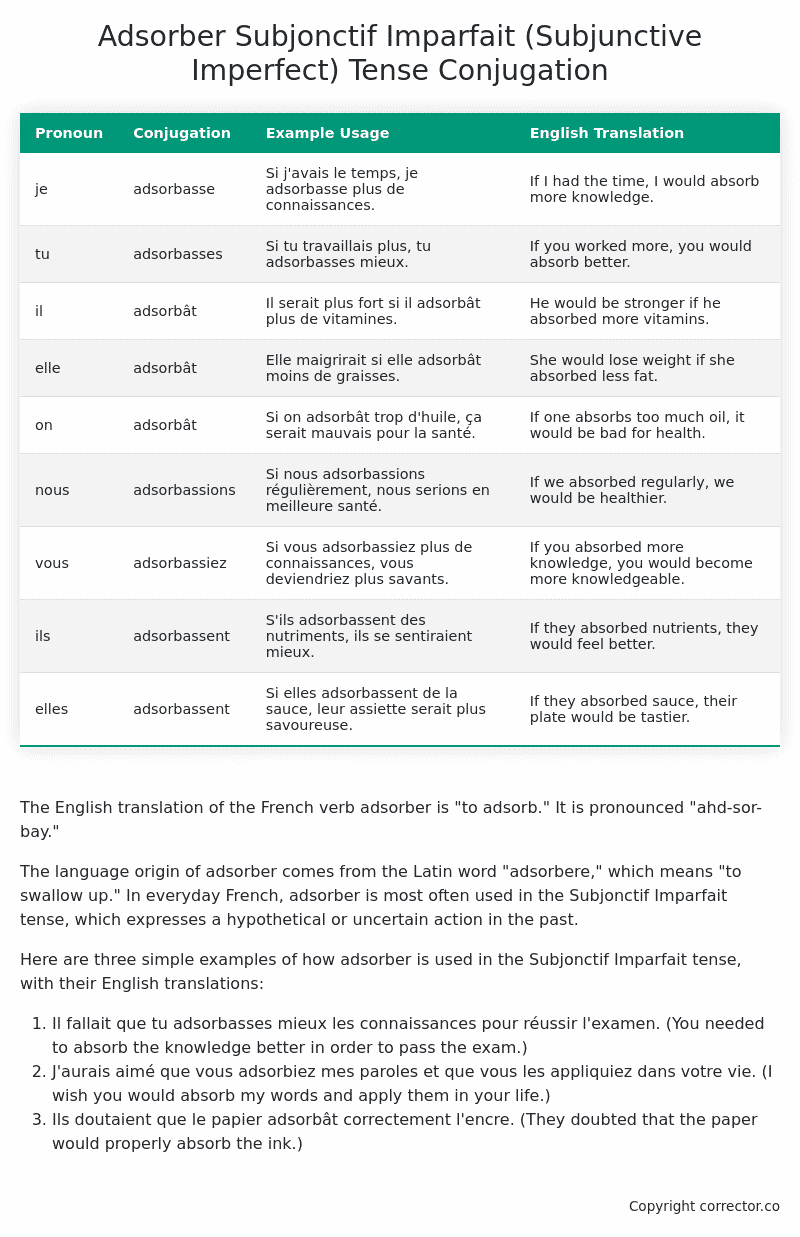Subjonctif Imparfait (Subjunctive Imperfect) Tense Conjugation of the French Verb adsorber
Introduction to the verb adsorber
The English translation of the French verb adsorber is “to adsorb.” It is pronounced “ahd-sor-bay.”
The language origin of adsorber comes from the Latin word “adsorbere,” which means “to swallow up.” In everyday French, adsorber is most often used in the Subjonctif Imparfait tense, which expresses a hypothetical or uncertain action in the past.
Here are three simple examples of how adsorber is used in the Subjonctif Imparfait tense, with their English translations:
- Il fallait que tu adsorbasses mieux les connaissances pour réussir l’examen. (You needed to absorb the knowledge better in order to pass the exam.)
- J’aurais aimé que vous adsorbiez mes paroles et que vous les appliquiez dans votre vie. (I wish you would absorb my words and apply them in your life.)
- Ils doutaient que le papier adsorbât correctement l’encre. (They doubted that the paper would properly absorb the ink.)
Table of the Subjonctif Imparfait (Subjunctive Imperfect) Tense Conjugation of adsorber
| Pronoun | Conjugation | Example Usage | English Translation |
|---|---|---|---|
| je | adsorbasse | Si j’avais le temps, je adsorbasse plus de connaissances. | If I had the time, I would absorb more knowledge. |
| tu | adsorbasses | Si tu travaillais plus, tu adsorbasses mieux. | If you worked more, you would absorb better. |
| il | adsorbât | Il serait plus fort si il adsorbât plus de vitamines. | He would be stronger if he absorbed more vitamins. |
| elle | adsorbât | Elle maigrirait si elle adsorbât moins de graisses. | She would lose weight if she absorbed less fat. |
| on | adsorbât | Si on adsorbât trop d’huile, ça serait mauvais pour la santé. | If one absorbs too much oil, it would be bad for health. |
| nous | adsorbassions | Si nous adsorbassions régulièrement, nous serions en meilleure santé. | If we absorbed regularly, we would be healthier. |
| vous | adsorbassiez | Si vous adsorbassiez plus de connaissances, vous deviendriez plus savants. | If you absorbed more knowledge, you would become more knowledgeable. |
| ils | adsorbassent | S’ils adsorbassent des nutriments, ils se sentiraient mieux. | If they absorbed nutrients, they would feel better. |
| elles | adsorbassent | Si elles adsorbassent de la sauce, leur assiette serait plus savoureuse. | If they absorbed sauce, their plate would be tastier. |
Other Conjugations for Adsorber.
Le Present (Present Tense) Conjugation of the French Verb adsorber
Imparfait (Imperfect) Tense Conjugation of the French Verb adsorber
Passé Simple (Simple Past) Tense Conjugation of the French Verb adsorber
Passé Composé (Present Perfect) Tense Conjugation of the French Verb adsorber
Futur Simple (Simple Future) Tense Conjugation of the French Verb adsorber
Futur Proche (Near Future) Tense Conjugation of the French Verb adsorber
Plus-que-parfait (Pluperfect) Tense Conjugation of the French Verb adsorber
Passé Antérieur (Past Anterior) Tense Conjugation of the French Verb adsorber
Futur Antérieur (Future Anterior) Tense Conjugation of the French Verb adsorber
Subjonctif Présent (Subjunctive Present) Tense Conjugation of the French Verb adsorber
Subjonctif Passé (Subjunctive Past) Tense Conjugation of the French Verb adsorber
Subjonctif Imparfait (Subjunctive Imperfect) Tense Conjugation of the French Verb adsorber (this article)
Subjonctif Plus-que-parfait (Subjunctive Pluperfect) Tense Conjugation of the French Verb adsorber
Conditionnel Présent (Conditional Present) Tense Conjugation of the French Verb adsorber
Conditionnel Passé (Conditional Past) Tense Conjugation of the French Verb adsorber
L’impératif Présent (Imperative Present) Tense Conjugation of the French Verb adsorber
L’infinitif Présent (Infinitive Present) Tense Conjugation of the French Verb adsorber
Struggling with French verbs or the language in general? Why not use our free French Grammar Checker – no registration required!
Get a FREE Download Study Sheet of this Conjugation 🔥
Simply right click the image below, click “save image” and get your free reference for the adsorber Subjonctif Imparfait tense conjugation!

Adsorber – About the French Subjonctif Imparfait (Subjunctive Imperfect) Tense
Formation
Common Everyday Usage Patterns
Interactions with Other Tenses
Subjonctif Présent
Indicatif Passé Composé
Conditional
Conditional Perfect
Summary
I hope you enjoyed this article on the verb adsorber. Still in a learning mood? Check out another TOTALLY random French verb conjugation!


